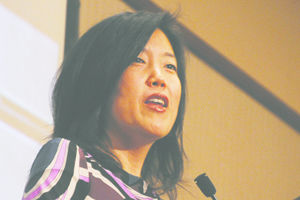Michelle Rhee speaks at Kent State Stark

Education Reformist Michelle Rhee kicked off featured speaker series at Kent State University Stark Campus on Monday October 10. Photo taken by Jim Lightcap
new TWTR.Widget({
version: 2,
type: ‘search’,
search: ‘#KWRhee’,
interval: 6000,
subject: ”,
width: 240,
height: 300,
theme: {
shell: {
background: ‘#b8b8b8’,
color: ‘#66a9c5’
},
tweets: {
background: ‘#b8b8b8’,
color: ‘#444444’,
links: ‘#1985b5’
}
},
features: {
scrollbar: true,
loop: true,
live: true,
hashtags: true,
timestamp: true,
avatars: true,
toptweets: true,
behavior: ‘default’
}
}).render().start();
Education advocate Michelle Rhee used personal and professional anecdotes to keep the audience laughing throughout her sold-out speech at Kent State Stark’s Timken Great Hall Monday night.
For example, she said her two daughters aren’t good soccer players, but visitors to the house would be fooled by the number of trophies and medals each girl possesses.
Audience members chuckled as she contrasted her daughters with a story about her own childhood when she attended an elementary school in Seoul, South Korea. Rhee said she was one of 70 students in the classroom, who were ranked based on academic performance.
“There was an inborn sense in the culture of competition,” Rhee said. “I believe we are not going to regain our position in the global economy until we regain our competitive spirit.”
Rhee served as Chancellor of D.C. Public schools from 2007 to 2010. She said the district was ranked among the worst in the nation with achievement gaps between the wealthy and poor students that were more than 70 percent in some areas. During her tenure as Chancellor of D.C. public schools, she is credited with double-digit increases in performance. She left her position with the district in 2010 and started a national advocacy group called Students First, a nonprofit that works to change educational laws locally and nationally.
Rhee talked about the controversial idea of merit pay for teachers and getting rid of guaranteed annual contractual raises. She told two stories about teachers she observed in a D.C. school.
The audience laughed at her description of a teacher’s frustration with a classroom of fourth grade students.
“I do believe that teachers should be paid differently based on how effective they are,” Rhee said.
She said when her former school district switched to merit pay it received hundreds of applications from people wanting to teach. Rhee said she believes if you offer competitive pay, good teachers will come.
Associate professor Claudia Khourey-Bowers said she believes that most teachers are not in the profession to make a lot of money.
“She thinks that essentially anybody can be a teacher, and if you bribe people with more money than other people then they will do things differently,” Khourey-Bowers said. “Everybody likes to make money, but it’s not the primary motivation for everyone.”
In response to Rhee’s views Khourey-Bowers has organized a public discussion Oct. 25 at Kent Stark’s University Center Dining Room.
“It made me think that we needed to take the stage as well,” Khourey-Bowers said. “It’s not a direct response to Michelle Rhee’s talk but a response to presenting other perspectives.”
Beth Williams, an HR manager at a call center in Canton, said she showed up to hear Rhee speak because she sees “the product of what comes out of the schools when they try to get jobs.”
“We have to teach them math skills, organization, critical thinking and time management,” Williams said.
She supports Rhee, and sees an application of her points to the upcoming referendum vote on whether to keep Ohio’s controversial new collective bargaining law that severely limits collective bargaining for public employees.
Williams said her mother was a teacher and she served as a substitute for a number of years. She said she supports the Republican effort to keep the law as it is currently written.
Rhee said she is a lifelong Democrat and supports the rights of people to collectively bargain, but she thinks some aspects like the length of the school year should be beyond the scope of a contract.
One of Rhee’s main points was that partisan politics should be removed from educational debate.
She said she believes that educators should “look at everything we do in the context of families and children.”
Contact Anna Staver at [email protected].


